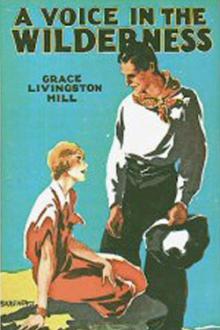A Voice in the Wilderness, Grace Livingston Hill [children's ebooks online .TXT] 📗

- Author: Grace Livingston Hill
- Performer: -
Book online «A Voice in the Wilderness, Grace Livingston Hill [children's ebooks online .TXT] 📗». Author Grace Livingston Hill
She took opportunity during that long ride to find out if the young man had known Rosa Rogers before; but he frankly told her that he had just come West to visit his sister, was bored to death because he didn't know a soul in the whole State, and until he had seen her had not laid eyes on one whom he cared to know. Yet while she could not help enjoying the gay badinage, she carried a sense of uneasiness whenever she thought of the young girl Rosa in her pretty fairy pose, with her fluttering pink fingers and her saucy, smiling eyes. There was something untrustworthy, too, in the handsome face of the man beside her.
There was just one shadow over this bit of a holiday. Margaret had a little feeling that possibly some one from the camp might come down on Saturday or Sunday, and she would miss him. Yet nothing had been said about it, and she had no way of sending word that she would be away. She had meant to send Mom Wallis a letter by the next messenger that came that way. It was all written and lying on her bureau, but no one had been down all the week. She was, therefore, greatly pleased when an approaching rider in the distance proved to be Gardley, and with a joyful little greeting she drew rein and hailed him, giving him a message for Mom Wallis.
Only Gardley's eyes told what this meeting was to him. His demeanor was grave and dignified. He acknowledged the introductions to the rest of the party gracefully, touched his hat with the ease of one to the manner born, and rode away, flashing her one gleam of a smile that told her he was glad of the meeting; but throughout the brief interview there had been an air of question and hostility between the two men, Forsythe and Gardley. Forsythe surveyed Gardley rudely, almost insolently, as if his position beside the lady gave him rights beyond the other, and he resented the coming of the stranger. Gardley's gaze was cold, too, as he met the look, and his eyes searched Forsythe's face keenly, as though they would find out what manner of man was riding with his friend.
When he was gone Margaret had the feeling that he was somehow disappointed, and once she turned in the saddle and looked wistfully after him; but he was riding furiously into the distance, sitting his horse as straight as an arrow and already far away upon the desert.
"Your friend is a reckless rider," said Forsythe, with a sneer in his voice that Margaret did not like, as they watched the speck in the distance clear a steep descent from the mesa at a bound and disappear from sight in the mesquite beyond.
"Isn't he fine-looking? Where did you find him, Miss Earle?" asked Mrs. Temple, eagerly. "I wish I'd asked him to join us. He left so suddenly I didn't realize he was going."
Margaret felt a wondering and pleasant sense of possession and pride in Gardley as she watched, but she quietly explained that the young stranger was from the East, and that he was engaged in some kind of cattle business at a distance from Ashland. Her manner was reserved, and the matter dropped. She naturally felt a reluctance to tell how her acquaintance with Gardley began. It seemed something between themselves. She could fancy the gushing Mrs. Temple saying, "How romantic!" She was that kind of a woman. It was evident that she was romantically inclined herself, for she used her fine eyes with effect on the young officer who rode with her, and Margaret found herself wondering what kind of a husband she had and what her mother would think of a woman like this.
There was no denying that the luxury of the ranch was a happy relief from the simplicity of life at the Tanners'. Iced drinks and cushions and easy-chairs, feasting and music and laughter! There were books, too, and magazines, and all the little things that go to make up a cultured life; and yet they were not people of Margaret's world, and when Saturday evening was over she sat alone in the room they had given her and, facing herself in the glass, confessed to herself that she looked back with more pleasure to the Sabbath spent with Mom Wallis than she could look forward to a Sabbath here. The morning proved her forebodings well founded.
Breakfast was a late, informal affair, filled with hilarious gaiety. There was no mention of any church service, and Margaret found it was quite too late to suggest such a thing when breakfast was over, even if she had been sure there was any service.
After breakfast was over there were various forms of amusement proposed for her pleasure, and she really felt very much embarrassed for a few moments to know how to avoid what to her was pure Sabbath-breaking. Yet she did not wish to be rude to these people who were really trying to be kind to her. She managed at last to get them interested in music, and, grouping them around the piano after a few preliminary performances by herself at their earnest solicitation, coaxed them into singing hymns.
After all, they really seemed to enjoy it, though they had to get along with one hymn-book for the whole company; but Margaret knew how to make hymn-singing interesting, and her exquisite voice was never more at its best than when she led off with "My Jesus, as Thou Wilt," or "Jesus, Saviour, Pilot Me."
"You would be the delight of Mr. Brownleigh's heart," said the hostess, gushingly, at last, after Margaret had finished singing "Abide With Me" with wonderful feeling.
"And who is Mr. Brownleigh?" asked Margaret. "Why should I delight his heart?"
"Why, he is our missionary—that is, the missionary for this region—and you would delight his heart because you are so religious and sing so well," said the superficial little woman. "Mr. Brownleigh is really a very cultured man. Of course, he's narrow. All clergymen are narrow, don't you think? They have to be to a certain extent. He's really quite narrow. Why, he believes in the Bible literally, the whale and Jonah, and the Flood, and making bread out of stones, and all that sort of thing, you know. Imagine it! But he does. He's sincere! Perfectly sincere. I suppose he has to be. It's his business. But sometimes one feels it a pity that he can't relax a little, just among us here, you know. We'd never tell. Why, he won't even play a little game of poker! And he doesn't smoke! Imagine it—not even when he's by himself, and no one would know! Isn't that odd? But he can preach. He's really very interesting; only a little too Utopian in his ideas. He thinks everybody ought to be good, you know, and all that sort of thing. He really thinks it's possible, and he lives that way himself. He really does. But he is a wonderful person; only I feel sorry for his wife sometimes. She's quite a cultured person. Has been wealthy, you know. She was a New York society girl. Just imagine it; out in these wilds taking gruel to the dirty little Indians! How she ever came to do it! Of course she adores him, but I can't really believe she is happy. No woman could be quite blind enough to give up everything in the world for one man, no matter how good he was. Do you think she could? It wasn't as if she didn't have plenty of other chances. She gave them all up to come out and marry him. She's a pretty good sport, too; she never lets you know she isn't perfectly happy."
"She is happy; mother, she's happier than anybody I ever saw," declared the fourteen-year-old daughter of the house, who was home from boarding-school for a brief visit during an epidemic of measles in the school.
"Oh yes, she manages to make people think she's happy," said her mother, indulgently; "but you can't make me believe she's satisfied to give up her house on Fifth Avenue and live in a two-roomed log cabin in the desert, with no society."
"Mother, you don't know! Why, any woman would be satisfied if her husband adored her the way Mr. Brownleigh does her."
"Well, Ada, you're a romantic girl, and Mr. Brownleigh is a handsome man. You've got a few things to learn yet. Mark my words, I don't believe you'll see Mrs. Brownleigh coming back next month with her husband. This operation was all well enough to talk about, but I'll not be surprised to hear that he has come back alone or else that he has accepted a call to some big city church. And he's equal to the city church, too; that's the wonder of it. He comes of a fine family himself, I've heard. Oh, people can't keep up the pose of saints forever, even though they do adore each other. But Mr. Brownleigh certainly is a good man!"
The vapid little woman sat looking reflectively out of the window for a whole minute after this deliverance. Yes, certainly Mr. Brownleigh was a good man. He was the one man of culture, education, refinement, who had come her way in many a year who had patiently and persistently and gloriously refused her advances at a mild flirtation, and refused to understand them, yet remained her friend and reverenced hero. He was a good man, and she knew it, for she was a very pretty woman and understood her art well.
Before the day was over Margaret had reason to feel that a Sabbath in Arizona was a very hard thing to find. The singing could not last all day, and her friends seemed to find more amusements on Sunday that did not come into Margaret's code of Sabbath-keeping than one knew how to say no to. Neither could they understand her feeling, and she found it hard not to be rude in gently declining one plan after another.
She drew the children into a wide, cozy corner after dinner and began a Bible story in the guise of a fairy-tale, while the hostess slipped away to take a nap. However, several other guests lingered about, and Mr. Temple strayed in. They sat with newspapers before their faces and got into the story, too, seeming to be deeply interested, so that, after all, Margaret did not have an unprofitable Sabbath.
But altogether, though she had a gay and somewhat frivolous time, a good deal of admiration and many invitations to return as often as possible, Margaret was not sorry when she said good night to know that she was to return in the early morning to her work.
Mr. Temple himself was going part way with them, accompanied by his niece, Forsythe, and the young officer who came over with them. Margaret rode beside Mr. Temple until his





Comments (0)